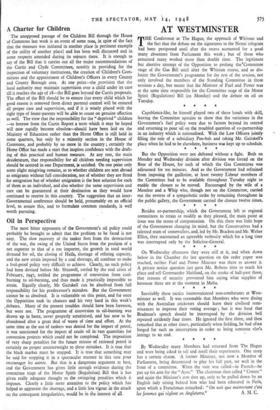Oil in Perspective
The most bitter opponents of the Government's oil policy could probably be brought to admit that the problem to be faced is not easy. The slow recovery of the tanker fleet from the destruction of the war, the swing of the United States from the position of a net exporter to that of a net importer, the growth in total world demand for oil, the closing of Haifa, shortage of refining capacity, and the new strain imposed by a coal shortage, all combine to make a fool-proof policy very difficult to achieve. Clearly, no such policy had been devised before Mr. Shinwell, rattled by the coal crisis of February, 1947, trebled the programme of conversion from coal- burning to oil-burning, and thus made it practically impossible to attain. Equally clearly, Mr Gaitskell can be absolved from full responsibility for his predecessor's mistakes. But the Government cannot be so absolved. It is vulnerable on this point, and for once the Opposition took its chances and hit very hard in this week's debates. Many of the present troubles should have been foreseen, but were not. The programme of conversion to oil-burning was drawn up in haste, never properly scrutinised, and has now to be abandoned after a great deal of waste of time and effort. At the same time as the use of tankers was denied for the import of petrol, it was sanctioned for the import of crude oil in vast quantities for conversion projects which could not be completed. The imposition of very sharp penalties for the future misuse of rationed petrol is certainly no proper counterweight to these mistakes. It is true that the black market must be stopped. It is true that something may be said for stopping it in a spectacular manner in this case pour encourager les autres. But that is a dangerous argument at best, and the Government has given little enough evidence during the committee stage of the Motor Spirit (Regulation) Bill that it has given really adequate thought to the swingeing penalties which it imposes. Clearly a little more attention to the policy which has helped to aggravate the shortage, and a little less vigour in the attack on the consequent irregularities, would be in the interest of all






























 Previous page
Previous page